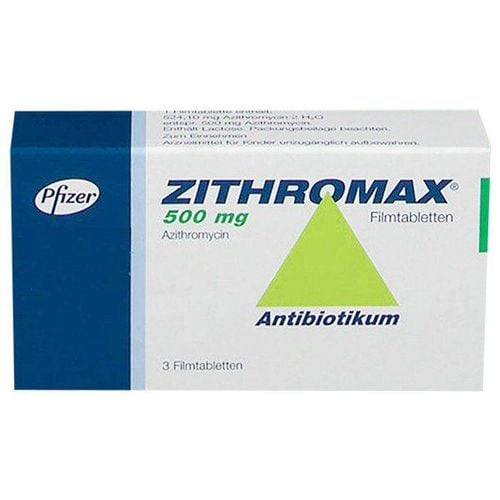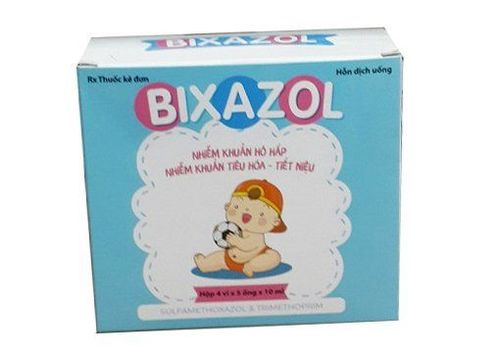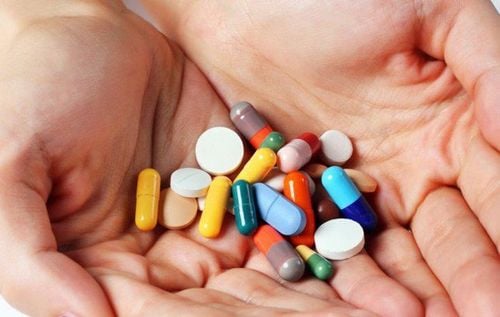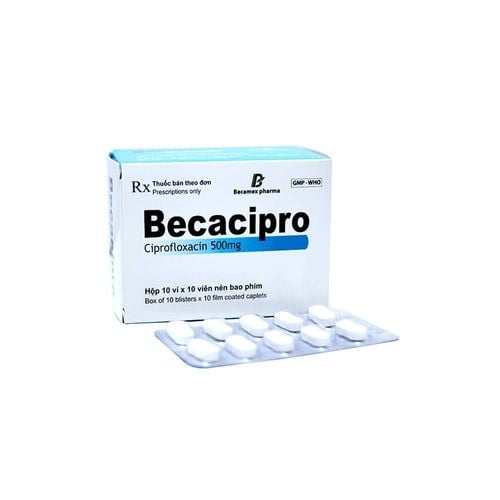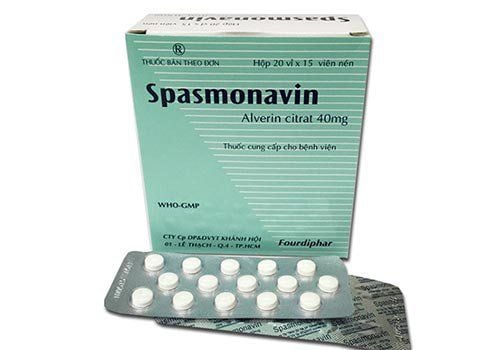This is an automatically translated article.
Cipad is an antibiotic with a very good bactericidal effect, treating cases of respiratory tract infections, skin infections, gonococcal infections, ... Cipad is used orally with good absorption in the body. Patients need to strictly follow all the instructions of the doctor for Cipad to promote the best treatment for bacterial infections.1. What is Cipad drug?
Cipad is a prescription medicine for effective treatment of respiratory tract infections, skin - soft tissue infections and some other bacterial infections. Cipad is manufactured by Albert David., Ltd - India in the form of film-coated tablets. The drug is packaged in a box of 10 blisters x 10 tablets, each tablet containing the main active ingredient is Ciprofloxacin (in the form of Ciprofloxacin Hydrochloride) content of 500mg. The active ingredient Ciprofloxacin in Cipad is known to be an antibiotic that has the ability to kill bacteria very well through the mechanism of gyrase fermentation of bacteria. This effect of Ciprofloxacin can disrupt the metabolism of bacteria, thereby inhibiting their growth. When taken orally, Ciprofloxacin is rapidly absorbed and reaches about 80% bioavailability. It is estimated that the drug takes about 3 - 5 hours to half-life in the body and the main route of elimination is urine.
2. What are the effects of Cipad?
Currently, Cipad is indicated for use in the treatment of the following infections:
Treatment of bone and biliary tract infections. Treatment of infections of the lower respiratory tract, intestinal tract, eyes, abdomen, gonorrhea, ovaries, uterus, urinary tract, skin, soft tissues and the whole body. Prevention of the risk of infection for people with agranulocytosis. However, it is necessary to avoid arbitrarily using Cipad for the following patients without a doctor's prescription:
People with a history of hypersensitivity or allergic reaction to Ciprofloxacin or any of the excipients included in the formulation. drug formula. Contraindicated for people with hypersensitivity to antibiotics of the Quinolone group. Cipad is contraindicated for pregnant patients, nursing mothers and pediatric patients because there has not been adequate research on the safety of the drug for these subjects.
3. Dosage and how to use Cipad effectively
Cipad drug is used orally because it is prepared in the form of tablets. When taking orally, the patient needs to swallow the tablet whole or split the dose by breaking or chewing the medicine. The time to use the drug will be specifically prescribed by the doctor based on the patient's infection status.
Below is the dose of Cipad for each patient according to the doctor's recommendation:
Treatment of mild - moderate infections: Use a dose of 250 - 500mg / time x 2 times / day. Treatment of severe infections - with complications: Use 750mg x 2 times/day and continue treatment for 5 - 10 days. Treatment of uncomplicated gonococcal infection: Take 1/2 tablet once only. Treatment of uncomplicated urinary tract infections: Take 1 tablet twice a day and treat within 3 days. Treatment of respiratory infections (such as sinusitis): Take 2 tablets divided into 2 times / day, treat within 10 days. For patients with severe pneumonia should take 3 tablets x 2 times / day and use within 1-2 weeks. Treatment of bone and joint infections: Take 2 tablets x 2 times/day and treat for 4-6 weeks. The dose of Cipad for patients with renal failure will be adjusted based on the level of creatinine clearance, specifically:
Creatinine clearance from 30 - 50ml/min: Take a dose of 250 - 500mg/ 12 hours. Creatinine clearance from 5 - 29ml / min: Oral dose of 250 - 500mg / 18 hours. Dialysis patients: Oral dose of 250 - 500mg / 24 hours.
4. Possible side effects when taking Cipad
When treating bacterial infections with Cipad, you may experience some of the following undesirable side effects:
Gastrointestinal reactions: Vomiting, nausea, stomach pain, indigestion, diarrhea or flatulence. Hepatic - renal reactions: Anemia, renal failure, liver failure, jaundice, hepatitis,... Skin reactions: Rash, skin itching, urticaria or Stevens - Johnson syndrome. Nervous and psychiatric disorders: Dizziness, headache, anxiety, hallucinations, agitation, migraine or convulsions. In rare cases, you may also experience Cipad side effects such as pseudomembranous colitis, hematologic changes, acute renal failure, muscle or joint pain. Regardless of the symptoms, you need to immediately report to a specialist for early treatment.
5. Precautions when using Cipad
During treatment with Cipad, patients need to be careful about a few things:
Be careful when using Cipad for people with hemodynamic disorders, patients with severe renal failure or the elderly. Caution should be exercised when administering Cipad to patients with CNS disorders or epilepsy. Discontinue use if symptoms of painful inflammation or tendon rupture occur. Cipad is an antibiotic, so it should only be used for patients with bacterial infections, avoid treating people with viral infections (unless a bacterial superinfection occurs). Cipad is metabolized mainly in the liver and excreted in the urine, so caution should be exercised when administering the drug to people with hepatic impairment. Cipad should not be used in people with Gram-positive or anaerobic infections because the effectiveness of the drug is not high for these conditions, so patients can consider other antibiotics. Missing a dose can reduce the effectiveness of Cipad, so patients should take up a dose as soon as they remember. However, it is important to avoid taking a double dose or taking it too close to the time of the next dose. Cipad overdose can increase the risk of side effects and cause some nervous system symptoms such as hallucinations, dizziness, headache, liver and kidney discomfort or convulsions. If these adverse symptoms occur, you need to quickly go to a medical facility for early treatment. Store the medicine at a temperature of 25 degrees Celsius, away from direct light and the reach of children. Carefully check the expiry date and quality of Cipad, if the medicine has expired or shows signs of change in color or texture, you need to stop using and dispose of damaged medicine according to regulations.
6. Drugs that may interact with Cipad
According to the doctor's recommendation, you need to avoid taking Cipad together with orange juice, milk, yogurt or calcium-containing products because they can reduce the absorption of the active ingredient in the drug, thereby causing a significant effect. regarding the effectiveness of treatment. The excretion process of active ingredient Ciprofloxacin will be disturbed when using together with Cipad with Probenecid, even causing toxicity to the body.
In addition, avoid concomitant use of Cipad with vitamin K antagonists because this combination may increase the anticoagulant time of vitamin K antagonists. If co-administration is required, the patient should be aware of the risk of bleeding.
Ideally, the patient needs to inform the doctor about the list of drugs being used to take appropriate adjustment measures and avoid adverse interactions. These preparations may include supplements, vitamins, functional foods, nutritional supplements or herbs.




